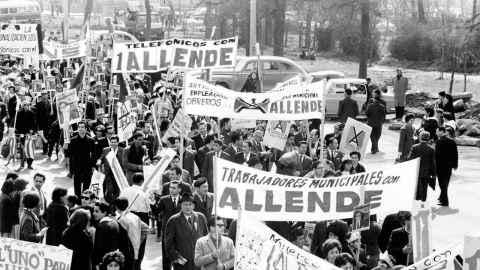Film event to mark 50 years since Chile’s September 11
28 August 2023
The dramatic events of Chile’s 17-year dictatorship under Pinochet is the focus of four films, screening free and open to the public, from 11 to 14 September at the University of Auckland.

On September 11, 1973, a coup d’état deposed Chile’s democratically elected socialist president, Salvador Allende, and replaced him with 17 years of brutal dictatorship under General Augusto Pinochet.
This “shock”, says Associate Professor Walescka Pino-Ojeda, director of the New Zealand Centre for Latin American Studies (NZCLAS) within the University's Faculty of Arts, created the conditions to make Chile the test lab for neoliberalism, later to be implemented globally.
“The coup was instigated by local business, landed and economic elites who, supported by the CIA during the Nixon-Kissinger administration, promoted the dictatorship that brought about massive economic liberalisation.
“This included removing tariff protections for local industry, banning trade unions, privatising social security and censoring entertainment as a way to reward regime supporters and punish opponents," she says.
The coup also resulted in the mass persecution of leftists, socialists and political critics, leading to executions, disappearances, the internment of as many as 80,000 and the torture of tens of thousands.

To commemorate the 50 years since this traumatic event, the New Zealand Centre for Latin American Studies (NZCLAS) has organised four consecutive days of films that focus on a painful period in Chile’s history and try to make sense of it.
“These films have been instrumental in enabling the sort of communal healing that is essential to restoring Chile’s social fabric and therefore the path back to democracy that has happened since,” says Dr Pino-Ojeda.
Subjects across the four films include: the testimonies of the working-class civilian leadership that defended the Allende government; a story set in the last days of the government from the point of view of friends from different social classes; the work of photographers who documented the strikes and protests during the regime, often risking their own lives; and the story of the Chilean disciples of American economist Milton Friedman, whose vision for Chile turned it into “the most extreme neoliberal country in the world”, according to IMDB.com.
The films will be given a historical and political introduction, followed by a dialogue with the audience, who are encouraged to share experiences, emotions, and ideas.

Monday 11 September: 6 to 9pm
The Battle of Chile - Part 3: People’s Power (director: Patricio Guzmán, 1979; 80 mins).
A selection of testimonies that provide an account of the intellectual and civic leadership of the working class that gave shape and defended the government led by Salvador Allende.
Tuesday 12 September: 6 to 9pm
Machuca (director: Andrés Wood, 2004; 120 mins). A story set in the last days of Allende’s government recounting the friendship of Gonzalo, a boy from the upper classes, and Machuca, from the shantytowns, who witness the tensions of the time.
Wednesday 13 September: 6 to 9pm
The City of Photographers (director: Sebastián Moreno, 2006; 80 mins). “The film traces the fearless photographers who documented strikes, demonstrations, and protests during the Chilean military regime, sometimes risking their own lives.” (IMDB.com)
Thursday 14 September: 6 to 9pm
Chicago Boys (directors: Carola Fuentes, Rafael Valdeavellano, 2015; 85 mins). “The story of Milton Friedman's disciples that, backed by the Chilean military dictatorship, turned Chile into the first and most extreme neoliberal country in the world.” (IMDB.com)
All films will be screened in Room 303 of the Arts 2 building (207) on the corner of Symonds Street and Grafton Road. Contact Associate Professor Walescka Pino-Ojeda, w.pino-ojeda@auckland.ac.nz, for more information.
Media contact
Julianne Evans | Media adviser
M: 027 562 5868
E: julianne@auckland.ac.nz